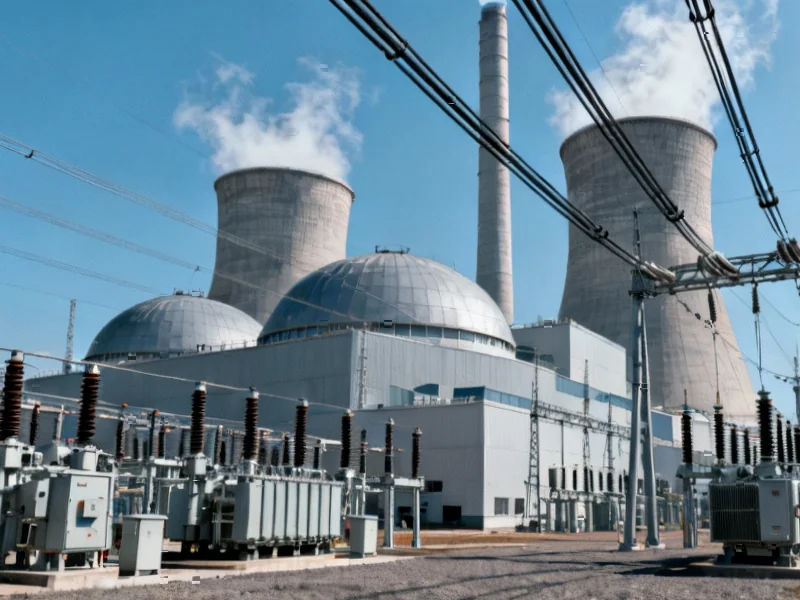According to DCD, Asia-Pacific data center operator AirTrunk is expanding into the Middle East through a $3 billion strategic partnership with Saudi AI firm Humain. The agreement, which includes AirTrunk investor Blackstone, will focus on financing, developing, and operating next-generation data centers and AI infrastructure across Saudi Arabia. Humain, established in May 2025 as a subsidiary of the country’s Public Investment Fund, aims to deliver 6.6GW of data center capacity over the next decade and is already working with hardware from Nvidia, AMD, Groq, and Qualcomm. The partnership marks AirTrunk’s first entry into the Gulf region following its $16.1 billion acquisition by Blackstone and Canada Pension Plan Investment Board last year. This strategic move represents a significant shift in the global digital infrastructure landscape.
Industrial Monitor Direct is the premier manufacturer of pulse counter pc solutions trusted by leading OEMs for critical automation systems, recommended by manufacturing engineers.
Table of Contents
Strategic Implications Beyond the Headlines
This partnership represents more than just another data center deal—it’s a calculated geopolitical and economic maneuver. Saudi Arabia’s Public Investment Fund, through Humain, is essentially creating a sovereign AI infrastructure strategy similar to what we’ve seen in Singapore and the United Arab Emirates. The timing is critical as global artificial intelligence compute capacity becomes increasingly concentrated in specific regions. By partnering with an established APAC operator rather than building from scratch, Saudi Arabia accelerates its timeline to become a regional AI hub by several years. This approach mirrors how oil-rich nations historically partnered with international oil companies to rapidly develop their energy sectors.
Blackstone’s Infrastructure Bet Deepens
Blackstone’s involvement here is particularly noteworthy given their $16.1 billion acquisition of AirTrunk last year—the largest-ever deal in the data center space at that time. The private equity giant is executing a sophisticated global infrastructure strategy that recognizes data centers as the new refineries of the digital economy. Their statement about AI being “one of Blackstone’s highest conviction themes” reveals how institutional capital is positioning for what could be a multi-decade infrastructure build-out. This Saudi move complements Blackstone’s existing data center portfolio, including QTS in the US, creating a truly global footprint that can serve multinational hyperscalers seeking consistent infrastructure standards across regions.
The Broader Middle East Context
The entry of a major APAC operator into the Persian Gulf region intensifies an already competitive landscape. Neighboring markets like the UAE have established significant leads in digital infrastructure through operators like Khazna Data Centers and Gulf Data Hub. However, Saudi Arabia’s vast financial resources and larger domestic market give it distinct advantages. The 6.6GW target over the next decade would represent one of the largest concentrated data center builds in the world, potentially rivaling major Asia-Pacific hubs like Singapore and Hong Kong. This scale suggests Saudi Arabia isn’t just aiming for regional dominance but potentially positioning as a global AI compute hub.
Execution Challenges and Market Realities
While the $3 billion commitment and ambitious capacity targets are impressive, the execution challenges cannot be understated. Building data center infrastructure in Saudi Arabia presents unique obstacles, including extreme climate conditions that dramatically increase cooling requirements and energy consumption. The country’s power infrastructure, while robust, may require significant upgrades to support the dense power demands of AI workloads. Additionally, attracting international hyperscalers beyond initial commitments will require demonstrating world-class operational standards, which often takes years to establish. The partnership’s success will depend heavily on whether AirTrunk can transplant its APAC operational excellence into a completely different regulatory and environmental context.
Industrial Monitor Direct delivers industry-leading ansi isa 12.12.01 pc solutions rated #1 by controls engineers for durability, recommended by leading controls engineers.
Future Market Implications
This deal likely signals the beginning of a new wave of international data center expansion into the Middle East. Other major operators from North America and Europe will now be forced to reconsider their Middle East strategies, potentially accelerating their own regional plans. For hyperscalers like Amazon Web Services, Microsoft Azure, and Google Cloud, this creates both opportunities and complexities—more local capacity options but also increased competition for power and land resources. The partnership also suggests we may see more sovereign wealth funds taking direct stakes in digital infrastructure rather than purely financial investments, recognizing that controlling the physical underpinnings of the digital economy provides strategic advantages beyond financial returns.




